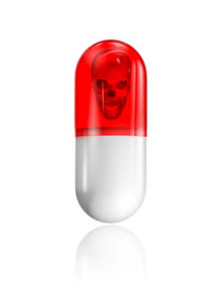Author: Dr. Stephen Chaney
 If you saw the recent headlines proclaiming that dietary supplements were responsible for 23,000 emergency room visits and 2,100 hospitalizations every year, you are probably wondering are food supplements safe to use at all. The study behind these headlines (Geller et al, New England Journal of Medicine, 373: 1531-1540, 2015) was based on an extrapolation from 63 hospitals to every hospital in the United States.
If you saw the recent headlines proclaiming that dietary supplements were responsible for 23,000 emergency room visits and 2,100 hospitalizations every year, you are probably wondering are food supplements safe to use at all. The study behind these headlines (Geller et al, New England Journal of Medicine, 373: 1531-1540, 2015) was based on an extrapolation from 63 hospitals to every hospital in the United States.
Some experts consider this to be an overestimation since it is almost 8 times higher than the 3,200 cases/year in the official FDA’s Serious Adverse Event Reporting database. However, for the purposes of this article I will accept the 23,000 numbers.
Let me start by putting the 23,000 number into perspective.
- It represents about 0.015% of the 150 million people in the US who use supplements.
- It represents about 1% of the emergency room admissions caused by side effects of properly prescribed medications.
In short, the headlines are over-dramatizing the dangers of dietary supplements. Dietary supplements are actually quite safe. However, even one emergency room visit due to a dietary supplement is too many – especially if it were to happen to you or a loved one. Consequently, I will analyze the study in more detail so that I can show you how to recognize and avoid those few supplements that are truly dangerous.
Are Supplements Dangerous?
Here is a breakdown of the data:
- 13% of the ER visits were due to allergic reactions. These were seldom serious enough to require hospitalization. This is also a type of problem that is probably unavoidable. Since many food supplements use natural ingredients, some degree of food allergies are to be expected.
- 13% of the ER visits were due to swallowing problems, primarily in people over the age of 65. The preventative measure here is also pretty simple. If you or a loved one has difficulty swallowing, choose pills that are small and slick, chewable, powder or liquid supplements.
- 20% of the ER visits were due to adverse effects caused by unsupervised ingestion of the supplements by children. The preventative measure here is pretty simple. Keep your supplements out of reach of small children – especially if they are chewable or have attractive colors. While the supplements may be perfectly safe when taken as recommended, the unsupervised ingestion of a whole bottle of almost any supplement by a small child is problematic.
- 41% of the ER visits were due to weight loss products (25.5%), energy products (10%), sexual enhancement products (3.4%) and bodybuilding products (2.2%). The most common adverse effect for these products were heart palpitations, chest pain, and irregular heartbeat. These are the kinds of supplements you really need to be most careful about.
Why Are Dangerous Supplements Even On The Market?
 Let’s start with the obvious question: Why are weight loss, energy, sexual enhancement and bodybuilding products the ones most likely to be dangerous? To quote Pogo (now I’m really dating myself): “We have met the enemy, and he is us”
Let’s start with the obvious question: Why are weight loss, energy, sexual enhancement and bodybuilding products the ones most likely to be dangerous? To quote Pogo (now I’m really dating myself): “We have met the enemy, and he is us”
- Weight Loss Products: We can listen all day long to experts tell us that we need to make lifestyle changes, and we should aim for no more than one or two pounds of weight loss per week. However, for most of us that advice goes in one ear and out the other. We want to lose weight fast, and we want it to be easy.
- Energy Products: Many of us are just plain exhausted because our diets are terrible; we are under stress; and we are burning the candle at both ends. We don’t want to eat better and change our lifestyle. We want high octane energy, and we want it now.
- Body Building Products: The story is similar, especially for males in the 20-34 age range. We want big muscles, and we don’t want to wait for the years of workouts it will take to build that kind of physique naturally. We want it now.
- Sexual Enhancement Products: ER admissions for sexual enhancement products were 100% male. What does that say about us guys? I won’t even go there.
Most supplement manufacturers are ethical and don’t make supplements that could harm us. However, there are a few unscrupulous  manufacturers who are only too happy to exploit our human weaknesses if they can make a buck in the process. They will give us exactly what we want, even if it kills us in the process.
manufacturers who are only too happy to exploit our human weaknesses if they can make a buck in the process. They will give us exactly what we want, even if it kills us in the process.
I’ve warned about these unscrupulous manufacturers in the past. The easiest way to create products that will burn off weight effortlessly, build muscle rapidly, and give you energy are to add chemically synthesized stimulants in the amphetamine family. For example, I’ve warned you about products containing stimulants such as DMAA and DEPEA in Are Dietary Supplements Safe and BMPEA in Are Sports Supplements Safe. They all work, but they also cause heart palpitations, chest pain, and irregular heartbeat. They can land you in the emergency room, and sometimes they can kill you.
In addition to stimulants, some weight loss products use diuretics, and some energy products use dangerous levels of caffeine, both of which can cause problems. Sexual enhancement products often use herbal ingredients like yohimbe bark that can be quite dangerous
Don’t Count On The FDA To Protect You
Unfortunately, you can’t count on the FDA to protect you. For example, in the case of the DMAA scandal, the FDA did not act until the day before a big expose was to air on 60 Minutes about the deaths caused by DMAA. They were shamed into taking strong action and removing DMAA from the shelves of retailers.
Case closed, you might think, but the truth is a bit scarier. That action was back in 2013. Since then, the FDA has ignored DMAA-containing products. The Human Performance Resource Center, an initiative of the Department of Defense, recently listed 39 products containing DMAA that are readily available, either online or from retail stores. Even though the FDA has classified DMAA as an illegal ingredient, it is still readily available, and they don’t act.
This is just one of many examples I could cite. It’s not clear whether the FDA is unwilling to protect us, or if it is overwhelmed. However, it is clear that if we want to avoid dangerous supplements, it is up to us.
How Can You Protect Yourself From Dangerous Supplements?
 If the FDA isn’t going to protect you, what can you do to protect yourself from dangerous supplements? There are threesimple things that you can do to protect yourself;
If the FDA isn’t going to protect you, what can you do to protect yourself from dangerous supplements? There are threesimple things that you can do to protect yourself;
#1: Use common sense.
- Don’t even consider those weight loss supplements that promise you’ll lose 5-10 pounds/week, or that they will make the fat melt away effortlessly.
- Walk away from those bodybuilding supplements that promise to make your muscles “explode” or give you “insane energy”.
- Put those energy supplements that promise a jolt of energy back on the shelf.
- As for sexual enhancement products, consult your doctor before you reach for a magic pill. Your problems in the bedroom may be caused by a treatable medical condition.
#2: Make the Commitment. A holistic lifestyle change that includes weight control, exercise, diet and supplementation may be more work, but it is so much safer and more beneficial in the long run.
#3: Choose wisely. Look for a supplement company with integrity.
- A company that is committed to only making products that are both safe and effective.
- A company that does clinical studies to make sure their products are safe and effective and publishes those studies in peer-reviewed scientific journals.
Are food supplements safe?
The Bottom Line
- A recent study reported that 23,000 emergency visits and 2,100 hospital admissions each year were caused by dietary supplements. Some experts consider this to be an overestimate. It is an extrapolation from 63 hospitals to every hospital in the United States, and it is approximately 8-fold higher than the FDAs Adverse Events database.
- While the headlines sound scary, when you put the data into perspective it is clear that dietary supplements are actually quite safe. Even if we accept the 23,000 ER visits/year as accurate, this represents:
- 015% of the supplement users in the US.
- Approximately 1% of the annual ER admissions due to side effects of properly prescribed medications.
- The main value of this study is that it allows us to identify what the dangers are and what strategies can help us avoid those dangers.
- 13% of the ER visits were due to allergic reactions. This is probably unavoidable. Since many food supplements use natural ingredients, some degree of food allergies are to be expected.
- 13% of the ER visits were due to swallowing problems, primarily in people over the age of 65. If you or a loved one has difficulty swallowing, the solution is pretty simple. Choose pills that are small and slick, chewable, powder or liquid supplements.
- 20% of the ER visits were due to adverse effects caused by unsupervised ingestion of the supplements by children. The preventative measure here is also pretty simple. Keep your supplements out of reach of small children.
- 41% of the ER visits were due to weight loss products (25.5%), energy products (10%), sexual enhancement products (3.4%) and bodybuilding products (2.2%). These are the kinds of supplements you really need to be most careful about. Some supplements in this category are truly dangerous.
- If we ask why these dangerous supplements exist, the answers are pretty simple.
- Many Americans are looking for quick and easy solutions. They want a magic pill or powder.
- A few unscrupulous supplement companies are only too happy to give them exactly what they want, even if it kills them in the process.
- Unfortunately, the FDA is not doing a good enough job of protecting us from the truly dangerous supplements on the market, so we need to protect ourselves.
- To protect ourselves from the dangerous supplements on the market we need to take 3 simple steps:
- Use common sense. Don’t fall for the advertising hype promising quick and easy solutions.
- Commit to true lifestyle change. Adopt a holistic lifestyle that includes weight control, diet, exercise, and supplementation.
- Choose your supplement manufacturer wisely. Choose one with integrity – one that is committed to making supplements that are both safe and effective.
These statements have not been evaluated by the Food and Drug Administration. This information is not intended to diagnose, treat, cure or prevent any disease.
